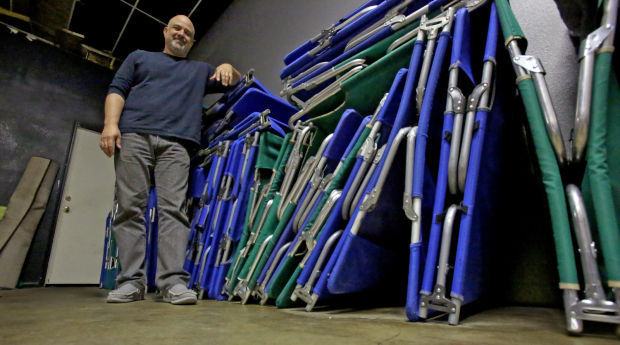A temporary men’s shelter at a church has taken in some of the residents of a downtown homeless camp, and the city is chipping in $20,000 to keep the doors open.
The city contracted last week with Central City Assembly, whose motto is “serving with no strings attached,” to offer 60 beds for 90 days to homeless men.
Fifty men slept there on rainy Monday night, said lead pastor Davide Ferrari.
While the shelter at 939 S. 10th Avenue is open to any homeless man, it was opened as a result of what’s happened downtown.
The city contract says the purpose of the emergency shelter is to “help reduce the number of homeless people overnighting in inappropriate, unsafe, unsanitary places not meant for human habitation.”
The shelter is less than a mile south of Veinte de Agosto Park, where people had been sleeping on sidewalks in a camp they dubbed Safe Park.
Some of the campers said they are protesting the “criminalization of homelessness,” and they have ongoing legal battles with the city. With no public bathrooms available, some people relieved themselves on the sidewalks and in other inappropriate places.
Last week the city gave the protesters a deadline to remove 30 sleeping boxes from the sidewalks, which they did by Friday evening.
Some of the campers moved into the CCA shelter, although it’s hard to tell how many.
Ferrari said church staff members don’t ask questions about the people using the shelter, don’t ask for ID or require the men to be sober or listen to a sermon.
The only requirements are that the men don’t cause trouble, drink alcohol or use drugs on site, he said.
“It’s a low-demand shelter, and that’s important because the cohort we’re dealing with aren’t people who would qualify for — or even want to be in — a formal shelter situation,” said Tucson City Council member Steve Kozachik.
People who balk at the $20,000 price tag should get out their calculators, he said. The per-bed per-night cost is only $3.70.
The city contacted the church for help, Ferrari said.
The church operates a temporary shelter in the winter, paid for by church groups, but it closed Feb. 28. The agreement with the city keeps the doors open until mid-June. There is no equivalent temporary shelter for women.
The city’s money helps pay the church’s utility and insurance bills, and it provides blankets and coffee and pays wages for a shelter supervisor, Ferrari said.
Meanwhile, Interim City Manager Martha Durkin is meeting with government and social-service groups to try to find a more permanent location for a shelter or other site.
The city also is working on a new ordinance that would prohibit urban camping, including the use of sleeping boxes and tents on sidewalks. But the new site needs to be ready before the city enacts the ordinance, Kozachik said.






